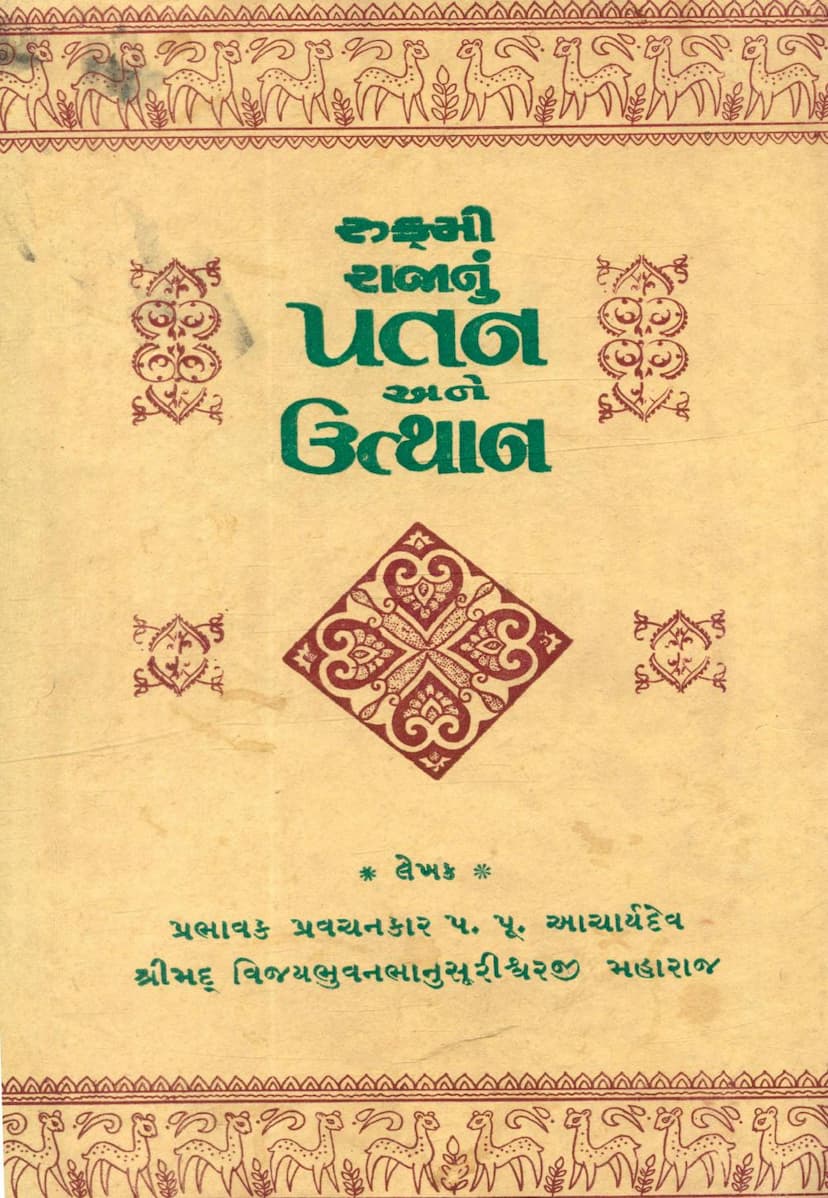Rukmi Rajanu Patan Ane Utthan Part 01
Added to library: September 2, 2025

Summary
Summary of "Rukmi Rajanu Patan Ane Utthan Part 01" by Bhuvanbhanusuri
This Jain text, authored by Acharya Shri Madh Vijay Bhuvan Bhanusurishwarji Maharaj, is the first part of a series detailing the downfall and rise of King Rukmi. Published by Divyadarshan Trust, the book draws from discourses delivered by the author, who is a prominent preacher and disciple of Acharya Shri Madh Vijay Premsurishwarji Maharaj.
The book emphasizes the Jain principle that liberation (Mukti) is indeed freedom from passions (Kashay). It argues that escaping the cycle of birth and death, suffering, and distress associated with the material world is only possible through the annihilation of karma, which in turn is achieved by overcoming passions like anger, pride, deceit, and greed.
The text begins by introducing the concept of "Apunabandhak Avastha" (a state of non-attachment), characterized by:
- Not engaging in sinful acts with intense passion.
- Not being overly attached to worldly pleasures and possessions.
- Consistently adhering to righteous conduct and appropriate behavior. Achieving this state is seen as crucial for spiritual progress.
The book then delves into the story of Rukmi, a princess, who, after her husband's untimely death, contemplates suicide. However, her father, the king, intervenes, explaining that suicide is not a solution. Rukmi's true reason for wanting to end her life isn't the loss of worldly pleasures, but rather the fear of succumbing to desires and engaging in improper conduct, which would tarnish her family's reputation. This demonstrates her inherent nobility and concern for righteousness.
The narrative highlights the importance of virtue and caution in spiritual practice. It stresses that even with religious practices, allowing even one passion to dominate can hinder spiritual advancement. The text uses the metaphor of "Dharma Police" (spiritual discipline) and "Kashay Chors" (passions as thieves) to illustrate that true progress requires controlling these passions.
A significant portion of the book is dedicated to exploring the detrimental effects of envy (Irshya). It explains how envy, even in individuals with strong spiritual practices, can lead to negative consequences. The story of the monk living near a lion's den is used as an example. While he endured physical hardship and danger, the envy he felt towards his fellow monk, Sthulabhadra, led him to a compromised spiritual state. This section underscores the need to overcome envy and cultivate positive emotions like friendship and compassion.
The text also extensively discusses the importance of controlling the mind and preventing negative thoughts ("Kuvikalp"). It emphasizes the practice of mindfulness and mental stability through various techniques, including focusing on one's true self and the nature of external objects. The narrative offers practical advice on how to achieve this stability, drawing from illustrative examples and stories.
Furthermore, the book delves into the benefits of penance (Tapa) and compassion (Daya). It explains how penance can help overcome negative inclinations and how compassion is the foundation of self-realization and divine insight. The text argues that cultivating compassion is the first step towards spiritual elevation.
The narrative then shifts to the king's guidance to his daughter Rukmi, emphasizing that instead of succumbing to despair and considering suicide, she should focus on righteous practices like charity (Daan), observance of vows (Shil), and penance (Tapa). These practices are presented as powerful tools to overcome negative influences and refine one's character. The king elaborates on the significance of charity, particularly for the less fortunate, and the benefits of observances like Samayika and Paushadh.
The book underscores the importance of celibacy (Brahmacharya), especially for women, and how it contributes to a pure and virtuous life. It also highlights the profound impact of spiritual practices and faith in divine power, citing examples of how devotion and adherence to principles can lead to miraculous outcomes.
The narrative then describes Rukmi's transformation. Influenced by her father's teachings, she dedicates herself to virtuous deeds, charity, and spiritual practices. This leads to a significant shift in her mindset, where she prioritizes her spiritual journey over worldly temptations, even when faced with the prospect of ruling a kingdom. Her unwavering commitment to celibacy and her elevated spiritual state impresses even those in positions of power.
The story then progresses to the demise of Rukmi's father, the king. Due to the absence of a male heir, the ministers propose Rukmi ascend the throne. However, Rukmi declines, prioritizing her spiritual path over worldly power. The ministers, impressed by her virtue and strong resolve, insist, acknowledging her inherent strength and virtue, particularly her unwavering celibacy, as a powerful asset for governance.
The book continues to illustrate the power of spiritual practice and devotion, citing numerous examples from Jain scriptures and history. These stories aim to demonstrate how faith and righteous actions can overcome adversions, attract divine favor, and lead to both worldly and spiritual prosperity.
The text also touches upon the concept of "Drishti Dosh" (faulty perception) and its detrimental consequences. It emphasizes how a flawed outlook can lead to negative states of mind and spiritual degradation. The importance of self-reflection and introspection is highlighted as a means to identify and rectify such faults.
Finally, the book stresses the need to cultivate virtuous qualities and engage in righteous conduct. It concludes by reiterating the path to spiritual upliftment through consistent practice of Dharma, emphasizing the transformative power of faith, penance, and compassion. The narrative subtly suggests that true strength lies not in worldly power but in spiritual discipline and virtuous living.